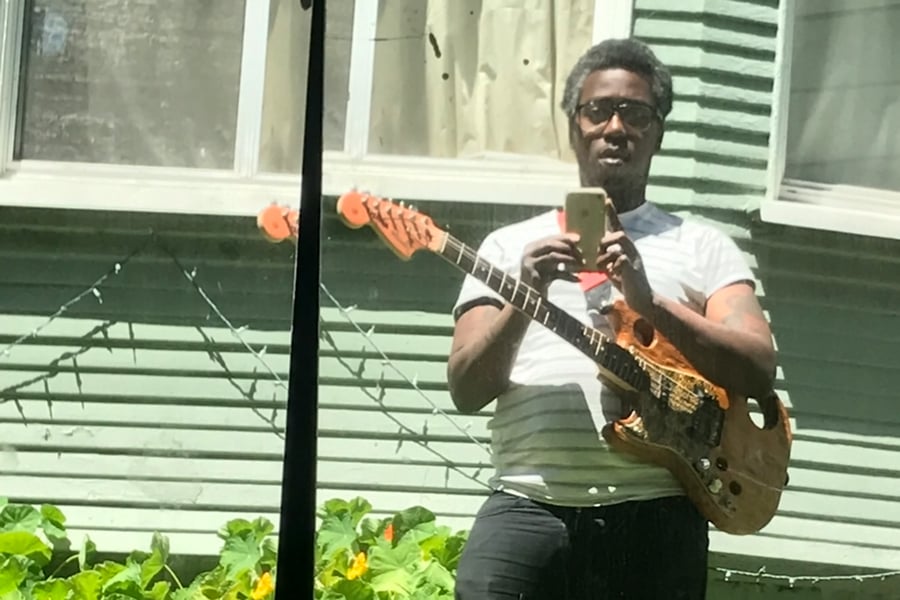This month Brontez Purnell released his new book, ‘100 Boyfriends,’ and now his friend and Green Day frontman Billie Joe Armstrong shares his enthusiastic support of his EP ‘White Boy Music’.
Though wrapped in the artifice of (as Purnell puts it) “exploring Eighties White Boy fake mod modalities,” White Boy Music, longtime punk veteran Brontez Purnell’s first solo EP, is a curious and wonderful rehashing of Nineties pop-punk all for the sake of “for fuck’s sake” itself.
Jagged and upbeat harmonies interplay with lyrics and two-part harmonies to yield all the charm of East Bay punk filtered through the hands of the multi-disciplinary maestro himself.
Now, I think it’s a been a bit muted that White Boy Music in a concept record: On the cover of the EP sits a self-portrait of Purnell, naked on a rubble heap, with his likeness obscured by a negation of black sharpie (something of a kick in the gut feeling happens when one considers the most likely message here). Black (in the context of the negation of the use of the sharpie) reads always in art context as void or negative space. We could certainly talk about political themes of negation of the Black voice in rock n roll. We can of course name the canon of Black rockers that we always talk about, that wouldn’t be hard. The real question for the NOW is: Who are the future ancestors of the Black rock & roll tradition? Is it something that a white audience could name or even crown? On a very basic and capitalist level, essentially to succeed at rock & roll, one would have to inherently hang out at lot of rock festivals, which in layman’s turns means “big groups of white people.” Seeing as how the last few years in America have gone down, I, being a total white dude, am made extremely nervous by large groups of white people. I can only imagine what Purnell feels like.
Punk also, of course, being a personal revolution (it’s only dead if it’s dead to you, personally), Purnell seems like he’s making a big claim for (well deserved) space for himself here. Purnell still sits “In the Garage” and tinkers away at pop punk records. Sitting also within this galaxy is the fact that Brontez does A LOT of shit: filmmaker, dancer (he has a punk dance company), writer, and all-around muse. Here he returns to his highest art form: rock & roll.
I’m not all together sure I 100 percent buy this as homage to “80s white boy fake mod.” I remember that stuff and it didn’t quite sound like this. Indie music of that particular decade and genre, I distinctly remember all having a certain vibe of sterility to it — no note was out of place, nothing about it particularly loud, or sonically jarring — whereas the sonics of “White Boy Music” hit with a certain static.

Brontez Purnell’s “White Boy Music” EP
The EP is recorded lo-fi, very urgently, but not altogether haphazardly. Unlike his earlier outfits this seems to be a bit more, dressed up, with a seven-part band, boasting strings, horns, keys, and even bitching hot licks by Andrea Genevieve, formerly of Purple Rhinestone Eagle and currently of the East Bay wizard-metal outfit Psychic Hit. For all its busy, ramblingly, and even jagged parts, ultimately the whole structure moves with this swagger to it. The word I think I’m looking for is “muscular.” In terms of sonic lineage, this EP owes more to its teenage Lookout Records print catalogue than really any mopey Brit of yesteryear.
But there are several lineages happening here at once. Of course, we can say “East Bay Pop-Punk,” but that doesn’t tell us much. (Like, which East Bay Pop-Punk does it sound like? There was never really one definitive sound there per se…) It is certainly a child of homocore (it’s mostly love songs). But then we must also acknowledge that Purnell is the last in a lineage of blues-musician men form Alabama. His great uncle was the East Bay’s own J.J. Malone, an employee of Berkeley’s fabled Fantasy Records. I hesitate to use the term intersectional (oof – but I did it). Ultimately, there is something very pleasurable about the Venn Diagram aspect of what all this record is touching. Like several things that have always been in conversation are finally gelling in the insistence of this record.
I recommend blasting this cassette tape on a big-ass speaker (or your iPhone headphones if you don’t have the former). If this were any reasonable point in the past I’d say it was music zine cover worthy. This EP being a work of art, I’d say, it belongs in a museum?
From Rolling Stone US






































